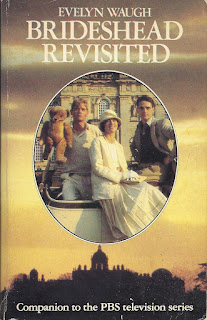Brideshead Revisted
Summary (from the publisher): Evelyn Waugh's most celebrated work is a memory drama about the intense entanglement of the narrator, Charles Ryder, with a great Anglo-Catholic family. Written during World War II, the story mourns the passing of the aristocratic world Waugh knew in his youth and vividly recalls the sensuous pleasures denied him by wartime austerities; in so doing it also provides a profound study of the conflict between the demands of religion and the desires of the flesh.
At once romantic, sensuous, comic, and somber, Brideshead Revisited transcends Waugh's familiar satiric exploration of his cast of lords and ladies, Catholics and eccentrics, artists and misfits, revealing him to be an elegiac, lyrical novelist of the utmost feeling and lucidity.
Review: Brideshead Revisited is the story of Charles Ryder's relationship with an aristocratic family in the twilight of an era. The novel is told by a Charles beleaguered by WWII, nostalgically reminiscing on his carefree college years, when he befriends Sebastian Flyte and eventually meets the whole family at their estate, Brideshead. At times comical, such as Sebastian's attachment to his teddy bear Aloysius as a college student and Charles' over the top disengaged father, the novel is also quite tragic as the family falls apart and Sebastian succumbs to alcoholism.
One theme of this novel is nostalgia for English nobility, as symbolized by the Flyte family. Charles clearly admires the family, and in a twist in the end, nearly inherits Brideshead. But WWII and the death of several family members has reduced the once grand family estate. In just a few years, the family goes from hosting coming out balls for the eldest daughter Julia to no longer participating in the same social scene at all by the time the younger daughter Cordelia is of age.
The novel intentionally leaves the nature of Charles and Sebastian's relationship vague. It's unclear if they were just friends or if they were more. There's a lot of broken relationships and marriages in this book. Sebastian and Charles do not remain friends and Lord and Lady Brideshead are famously separated. After he marries, Charles is especially callous about his wife and children and appears disinterested in them entirely and in fact divorces his wife to be with Julia Flyte, who is herself married by that point.
Catholicism is another major theme of the book, as an intiatially agnostic Charles spends more time with the very Catholic Brideshead clan. There's a lot of stress and emphasis on grace and belonging to the church and staying true to the church. Ultimately, Charles and Julia do not remain together because of her faith.
Waugh paints sort of a grim picture of England in wartime, as the novel opens and closes with a dark and war torn country. While this novel is less about Charles Ryder but more about the Flyte family, I do wonder what becomes of Charles and also the remaining Flytes in the years after the conclusion of the novel. I wonder how the novel's frame story and narrative tone would have differed had Waugh waited a while after the end of WWII to finish writing.
Stars: 4
At once romantic, sensuous, comic, and somber, Brideshead Revisited transcends Waugh's familiar satiric exploration of his cast of lords and ladies, Catholics and eccentrics, artists and misfits, revealing him to be an elegiac, lyrical novelist of the utmost feeling and lucidity.
Review: Brideshead Revisited is the story of Charles Ryder's relationship with an aristocratic family in the twilight of an era. The novel is told by a Charles beleaguered by WWII, nostalgically reminiscing on his carefree college years, when he befriends Sebastian Flyte and eventually meets the whole family at their estate, Brideshead. At times comical, such as Sebastian's attachment to his teddy bear Aloysius as a college student and Charles' over the top disengaged father, the novel is also quite tragic as the family falls apart and Sebastian succumbs to alcoholism.
One theme of this novel is nostalgia for English nobility, as symbolized by the Flyte family. Charles clearly admires the family, and in a twist in the end, nearly inherits Brideshead. But WWII and the death of several family members has reduced the once grand family estate. In just a few years, the family goes from hosting coming out balls for the eldest daughter Julia to no longer participating in the same social scene at all by the time the younger daughter Cordelia is of age.
The novel intentionally leaves the nature of Charles and Sebastian's relationship vague. It's unclear if they were just friends or if they were more. There's a lot of broken relationships and marriages in this book. Sebastian and Charles do not remain friends and Lord and Lady Brideshead are famously separated. After he marries, Charles is especially callous about his wife and children and appears disinterested in them entirely and in fact divorces his wife to be with Julia Flyte, who is herself married by that point.
Catholicism is another major theme of the book, as an intiatially agnostic Charles spends more time with the very Catholic Brideshead clan. There's a lot of stress and emphasis on grace and belonging to the church and staying true to the church. Ultimately, Charles and Julia do not remain together because of her faith.
Waugh paints sort of a grim picture of England in wartime, as the novel opens and closes with a dark and war torn country. While this novel is less about Charles Ryder but more about the Flyte family, I do wonder what becomes of Charles and also the remaining Flytes in the years after the conclusion of the novel. I wonder how the novel's frame story and narrative tone would have differed had Waugh waited a while after the end of WWII to finish writing.
Stars: 4



Comments
Post a Comment